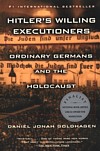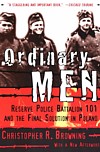
 An
Examination of:
An
Examination of:Daniel Jonah Goldhagen's
Hitler’s Willing Executioners:
Ordinary Germans and the Holocaust (1996)
by Alex Tietjen (about the author), November 2003

 An
Examination of:
An
Examination of:
Daniel Jonah Goldhagen's
Hitler’s Willing Executioners:
Ordinary Germans and the Holocaust (1996)
by Alex Tietjen (about the author), November
2003
"There but for the grace of God go I," is the most commonly preached lesson of the Holocaust. If we are not constantly on guard against our own hatred and let our intolerance get the better of us we are just as capable of perpetuating something as terrible as the Nazi "Final Solution." However, in Daniel Goldhagen's 1995 book Hitler's Willing Executioners: Ordinary Germans and the Holocaust, the author proposes that there is something fundamentally different between "us" and the German polity before and during Nazi rule.
The book Hitler's Willing Executioners begins with Goldhagen's thesis. He argues that the Germans were fundamentally different from other peoples, especially in regard to anti-Semitism. His opinion is that they were culturally anti-Semitic and that a Judenfrage or Jewish Problem was an already established fact in German society before the rise of Nazism. Additionally he argues that all Germans may not have agreed with Nazi policy in many regards, but they were all thoroughly Nazified when it came to the Jews.
The next section of the book articulates the rise of eliminationist anti-Semitism. Goldhagen focuses in on how this had been a growing phenomenon and was already a problem right after the end of World War I. His next topic is the treatment and abuse of Jews under Nazi power.
Next in the book is a section on perpetrators and especially Police Battalion 101. The Police Battalion was active in the mass murder of Jews in the conquered territory in the East. Goldhagen illustrates this, his most integral piece of evidence, by explaining in very graphic detail how the murders happened. He also mentions several key facts about the Police Battalion that help make his point about this calamity being uniquely German. First, the men of the police battalion were not forced to kill. Instead, they were given a way out by their commander. Second, very few of them took this option. Third, these men were not any specially indoctrinated bunch of Nazis, but rather drafted men not capable of serving in the regular forces.
Finally, Goldhagen demonstrates how emblematic the death camp was to German society under Nazi rule. It his opinion that cultural traditions, Christianity, and the supposed prevalence of Jewish population as being un-German all contributed to the Holocaust.
Since its publication, Hitler's Willing Executioners has generated much controversy in both academic and mainstream thought on the Holocaust. In response to Daniel Goldhagen's book, Christopher Browning has added a new afterward to his book, Ordinary Men: Reserve Battalion 101 and the Final Solution in Poland. This critique is a good summary of those who disagree with Goldhagen.
In this afterward Browning calls into question the legitimacy and accuracy of Goldhagen's work. Browning does not believe that Goldhagen has met the "burden of proof" to establish the correctness of his claim. He cites the glancing over that Goldhagen gives to the perpetrators of non-German origin, as well as the German violence towards Poles and Russian POWs.
Browning also argues that German society was not completely behind Hitler and Nazism in regard to anti-Semitism. While agreeing that their was definitely anti-Semitic thought in Germany prior to the rise of the Nazi machine, it was mostly concentrated in the conservative, anti-democratic, fascist minority. He also brings up the point that Goldhagen largely ignores the other victims of Nazi oppression and brutality, seeking to focus exclusively on the Jews. Browning also argues that Goldhagen does not look at more than one cause, namely hatred of Jews. While Browning believes that their were many causes for the action of perpetrators such as peer pressure, government sanction, and careerism.
The thesis behind Browning's argument against Goldhagen's view really comes down to this; Goldhagen formulated a conclusion and worked backward to find evidence that supported his position and a thesis that would lend itself easily to his view of what happened, and why it happened. This is a striking statement to make, but Browning does back it up well and shows several glaring wholes in Goldhagen's argument.
Bibliography:
Goldhagen, Daniel J. Hitler's Willing Executioners: Ordinary Germans and the Holocaust. New York: Random House, 1997.
Browning, Christopher R. Ordinary Men: Reserve Battalion 101 and the Final Solution in Poland. New York: HarperCollins, 1998.
Links:
http://www.h-net.msu.edu/~german/discuss/goldhagen/
This site is a discussion of Daniel Goldhagen’s work. It includes links to
articles and reports relevant to the review both Goldhagen and Browning’s
books. Especially of note is the article titled “Excerpts from Goldhagen's
Review of Christopher Browning's Ordinary Men”.
http://www.nybooks.com/articles/1278
This link is a response written by Daniel Goldhagen to a review of his book.
In it he defends the book's reasoning, the way it indicts the entire German
culture, and his belief of the anti-Semitism of Germany.
http://www.findarticles.com/cf_0/m1548/n3_v13/20925650/p1/article.jhtml?term=%22michael+walzer%22
This is a link to Tikkun, a Jewish journal that has reviewed
the book from its point of view. They weigh in strongly on the side of Goldhagen
and believe he has the better part of the argument.